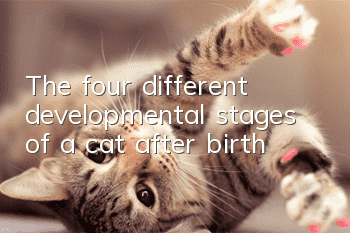The four different developmental stages of a cat after birth

This article explains the growth rates and changes of kittens at different stages after birth. In addition, after clarifying the proper nouns for different stages, we will have a deeper understanding of some diseases in kittens.
One thing to note here is that premature kittens or kittens troubled by diseases may lag by 2-3 weeks at the different stages mentioned in this article.
Article source: Cat Academy
▍Neonatal stage
1-14 days after birth is the neonatal stage.
Newborns are still very weak, in the early stages of development, and unable to cope with stress. The first 36 hours after birth are very critical. During this period, the cat needs to eat colostrum and receive care from the mother cat.
Newborns usually have an empty stomach but will be full within 24 hours. Weight usually doubles within 1 - 2 weeks.
Newborns spend 90% of their time nursing and sleeping. They are relaxed and not alert most of the time, and may shake their bodies while sleeping. When he wakes up, he will look for the nipple to feed.
At this time, the ears and eyes are closed. They squirm their bodies, and once they open their eyes, they will begin to learn to crawl. They usually start to open their eyes in about 10 days.
Newborns will scream if they feel pain, heat, cold, or hunger. When you hear howling, you must provide help in time. Continuous howling will lead to physical exhaustion, which is very dangerous.
Newborns cannot regulate their own body temperature. Their body temperature depends on the ambient temperature. They will snuggle in the arms of their mother cats or gather with their siblings to maintain body temperature. Therefore, no matter what the situation, pay attention to monitoring the ambient temperature.
In summer, do not use direct air conditioning. In winter, place a heating pad under the birthing nest or put it in a constant-temperature birthing box.
Healthy newborns will have a good swallowing reflex. This function is fully developed before birth, but premature kittens may not have a swallowing reflex. This prevents it from feeding properly.
The stomach of a newborn is very small, so he can only eat a small amount of milk at a time. He needs frequent feedings to maintain normal physical signs. If he cannot feed in time, his life will be threatened by death.
They are unable to urinate and defecate on their own. It requires stimulation from the female cat or your help to defecate smoothly.
The first bowel movement of a newborn is meconium, which is tar-like. This meconium is formed before birth. The poop after birth is usually dark yellow, neither soft nor hard, and is formed from milk. As growth continues, the color of the poop turns to yellowish brown.
▍Transitional stage
The 14th to 21st days after birth are called the transitional stage.
During this period, kittens begin to explore their environment and are no longer inseparable from their mother cats.
They grow rapidly, gain weight rapidly, sleep less and less, their eyes have opened, and their ear canals have opened. The world is full of novelties for them.
They begin to focus and observe moving objects. Although they can see things at this time, their eyesight is still very weak, so if you want to take pictures of them, be sure to avoid using flash and use a wide aperture instead. Strong light will damage their eyes.
Although they can partially control their body temperature at this time, this ability is still very weak, and they may occasionally suffer from temperature imbalance.
▍Socialization stage
The period between 21 days after birth and 12 weeks of age is called the socialization stage.
Kittens during this period are very active. Kittens in the same litter will play with each other and learn some correct behaviors in the process of playing. The use of the cat litter box is also learned at this stage.
Kittens will become more and more independent during this period and begin to interact with people, other cats, and objects.
During this period, you must avoid leaving "psychological trauma" on the kitten, which requires you to be gentle at all times. The trauma at this time may remain for life and lead to a series of behavioral problems, which will be a big trouble in the future.
Likewise, if they suffer from a congenital disease while they are together and have not had it before, they will gradually develop it during this period.
Their ability to control body temperature is also getting stronger, and their eyesight is further developed, which will continue until several months later.
Hearing becomes very acute at 3-4 weeks, and the kitten also begins to learn to judge the meaning of different sounds. It will feel scared because of your scolding.
Also at 3-4 weeks, they may start squatting to eliminate. At the same time, you will also see the first teeth emerge.
▍Juvenile Stage
After 12 weeks - 6 months of age, it is called the juvenile stage.
Kittens begin to mature slowly, and their sexual organs begin to mature. Some early-maturing breeds (especially short-haired breeds) will reach sexual maturity at 5-6 months. Some female cats will go into heat for the first time.
However, among breed cats, their weight and bones will continue to develop after five or six months. Some long-haired breeds, such as Persian cats, may not fully mature until one and a half years old, or even two years later.
- Tips for removing black chin in cats
- What does a cat eat to produce a lot of milk?
- The kitten keeps blinking one eye
- What to do if a cat is afraid of people
- There's a reason why cats always lick their fur
- What should I do if my cat refuses to have its nails cut?
- What should I do if my cat refuses to cut its nails? The shit shovel officer can do this!
- How to choose a Russian blue cat
- How to check if your cat has fleas and ticks?
- How to tell if a cat has a fever? Will a cat's fever heal on its own?



